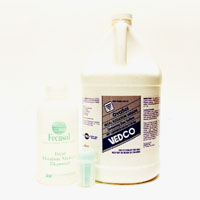
Fecal Flotation
Description: A fecal flotation is a test which is usually performed by the local veterinarian. A sample of fresh feces (stool) is taken from an animal suspected of having an internal parasite infection (coccidia, roundworms, tapeworms, and others). Depending on the technique used, only a small amount of feces is necessary to perform the test. There are many different types of fecal flotation tests available; therefore, it is advisable to consult with a veterinarian before taking the sample. One method of obtaining a fecal sample involves using a latex glove. A latex glove can be worn when retrieving a stool sample from the ground. The glove can then be turned inside out, removed from the hand, and placed inside a plastic container or bag for transport to the veterinarianís office.
Procedure: The stool sample is mixed with any one of a variety of solutions with the intent to "float" or bring any parasitic ova (eggs) to the surface, while allowing the majority of the sample to sink to the bottom of the solution. The parasitic ova can be drawn off the surface of the solution and observed with a microscope.
Diagnostic Value: High, for cats suffering from diarrhea or weight loss that is associated with parasite infections.
Risks to Patient: None.
Relative Cost: Low.

Fecal Scraping/Cytology
Description: An instrument is used to scrape the inner lining of the colon to obtain a sample of feces and cells. This sample is then smeared on a glass slide, stained with special stains, and then observed with a microscope.
Diagnostic Value: Good for cats with diarrhea.
Risks to Patient: Very low. Some bleeding may occur.
Relative Cost: Low.